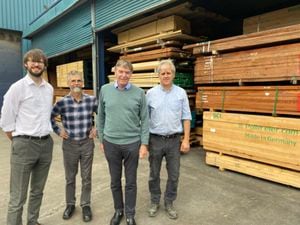MP makes fact-finding visit to timber company ahead of committee inquiry into industry
An MP went on a fact-finding mission to a company near Ludlow ahead of an inquiry into the sustainability of the UK timber industry.

Ludlow MP Philip Dunne visited Hazlin, a growing local timber products manufacturer, which makes fire resistant doors for the NHS, employing 85 members of staff across two sites in Burford and Bromfield, near Ludlow.
The visit comes as the Environmental Audit Committee, chaired by Mr Dunne, launched an inquiry in July into the sustainability of the UK Timber industry in the context of global deforestation.
The Inquiry will “explore how best to scale up a sustainable and resilient domestic timber sector to reduce reliance on imports, whilst also achieving its wider nature recovery and biodiversity goals through woodland creation”.
Mr Dunne said: “It is vital that we look holistically at the whole production cycle of the timber industry in the UK if we are to secure a sustainable future for the sector.
"From independent tree nurseries, woodlands managed by Forestry England, the Woodland Trust and local farmers, to our timber mills and stockholding yards and local manufacturers like Hazlin; I am looking to understand the part each has to play in ensuring sustainable sourcing of timber through woodlands over future decades.
“Visiting Chris Jones and his son Tomos, with Ian Makins who has been at Hazlin since it started, gave me useful insights into the sector locally and the challenges of sourcing domestic timber. I am also grateful to them for submitting evidence to the EAC inquiry.”
Mr Dunne also marked the 50th Anniversary of the Woodland Trust. Since 1972, the Trust has planted 55 million trees and restored 85,000 acres of damaged woodland.
Mr Dunne said: "The work of the Woodland Trust is an apt reminder that the UK’s beautiful rural landscape is a carefully managed one, not only in the last half-century since their founding, but for thousands of years before that. With global timber demand set to quadruple by 2050, it is crucial that we work to preserve these woodlands for future generations and plant more woodlands to help reduce emissions by capturing carbon."





